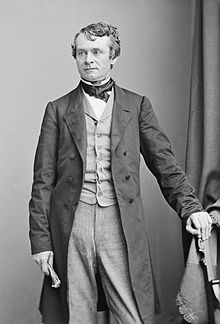Andrew Gregg Curtin
This article needs additional citations for verification. (April 2010) |
Andrew Gregg Curtin | |
|---|---|
 | |
| 15th Governor of Pennsylvania | |
| In office January 15, 1861 – January 15, 1867 | |
| Preceded by | William F. Packer |
| Succeeded by | John W. Geary |
| Member of the United States House of Representatives for Pennsylvania's 20th | |
| In office 4 March 1881 – 3 March 1887 | |
| Preceded by | Seth H. Yocum |
| Succeeded by | John Patton |
| United States Ambassador to Russia | |
| In office 1869–1872 | |
| President | Ulysses S. Grant |
| Preceded by | Cassius M. Clay |
| Succeeded by | James L. Orr |
| Personal details | |
| Born | April 22, 1817 Bellefonte, Pennsylvania, U.S. |
| Died | October 7, 1894 (aged 77) Bellefonte, Pennsylvania, U.S. |
| Political party | Whig, Republican, Democratic, |
| Profession | Politician, Lawyer |
Andrew Gregg Curtin (April 22, 1817 – October 7, 1894) was a U.S. lawyer and politician. He served as the 15th Governor of Pennsylvania during the American Civil War.
Biography
Curtin was born in Bellefonte, Pennsylvania. His parents were Roland Curtin, Sr., a wealthy Irish born iron manufacturer from County Clare, and Jane (Gregg) Curtin, the daughter of US Senator Andrew Gregg.[1] He attended Dickinson College and the Dickinson School of Law and was employed as a lawyer. His first public office was as Secretary of the Commonwealth. In 1855, Governor James Pollock appointed him as Superintendent of Public Schools. He switched political allegiance from the Whigs to the new Republican political party in 1860, with his successful run for governor. He served in that office from 1861 until 1867.
During the Civil War, Curtin organized the Pennsylvania reserves into combat units, and oversaw the construction of the first Union military camp for training militia. It opened in an agricultural school nearby Harrisburg (Pennsylvania) as Camp Curtin on April 18, 1861 and more than 300 000 men were drilled there during 4 years. In the years that followed, Curtin became a close friend and confidant of Abraham Lincoln, visiting the White House several times in order to converse about the status of the war effort.
Curtin was very active during the Gettysburg Campaign, working with Major General Darius N. Couch and Major Granville O. Haller to delay Robert E. Lee's Army of Northern Virginia and prevent it from crossing the Susquehanna River. Major General George G. Meade, a Pennsylvania officer whom Curtin had recommended for brigadier general and command of one of the Pennsylvania reserve brigades in 1861, defeated Lee in the Battle of Gettysburg.
After the Battle of Gettysburg, Governor Curtin was the principal force behind the establishment of the National Cemetery there. Through his agent, David Wills, Curtin procured the attendance of President Abraham Lincoln at the dedication of the cemetery. Governor Curtin was sitting with Lincoln on the platform on November 19, 1863, when Lincoln delivered his Gettysburg Address.
In his first term, Governor Curtin suffered a severe breakdown from the stresses of war. Secretary of State Eli Slifer handled governmental affairs during the increasingly frequent periods when Curtin was incapacitated. President Lincoln offered the governor a diplomatic position abroad, but he chose to run for reelection in 1863.
To coordinate Union war efforts, Curtin convened the Loyal War Governors' Conference on September 24 and September 25, 1862, in Altoona. This event was one of his most significant contributions to the Union war effort. He formed the Pennsylvania State Agency in Washington, and another branch in Nashville, Tennessee, to provide support for wounded soldiers on the battlefield and returned home. He also founded the state-funded Orphan's School to aid and educate children of military men who had died for the Union cause.
Soon after ending his second term, Curtin switched to the Democratic political party, and was appointed Minister to Russia by President Ulysses S. Grant. He later served as a Democratic Congressman from 1881 until 1887 in the United States House of Representatives. He died at his birthplace of Bellefonte, Pennsylvania, and is buried there in Union Cemetery.
Curtin's family was prominent in Pennsylvania politics and in the Civil War. He was the grandson of Andrew Gregg, also a prominent Pennsylvania politician. He was the uncle of John I. Gregg and cousin of David McMurtrie Gregg, both Union generals in the Civil War. He also was a cousin of Col John I. Curtin.
References
- ^ "Roland Curtin, Sr (1764–1850)". Findagrave.com. Retrieved 2009-07-25.
References
- Eicher, John H., and Eicher, David J., Civil War High Commands, Stanford University Press, 2001, ISBN 0-8047-3641-3.
- Bucknell University's Biography of Andrew Gregg Curtin
- United States Congress. "Andrew Gregg Curtin (id: C001004)". Biographical Directory of the United States Congress. Retrieved on 2009-03-23
External links
- 1817 births
- 1894 deaths
- Governors of Pennsylvania
- Pennsylvania Republicans
- United States ambassadors to Russia
- Members of the United States House of Representatives from Pennsylvania
- Pennsylvania Democrats
- People from Centre County, Pennsylvania
- People of Pennsylvania in the American Civil War
- American Presbyterians

